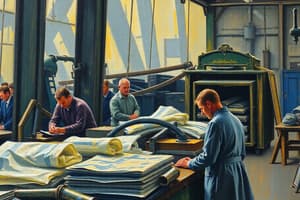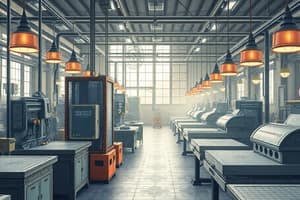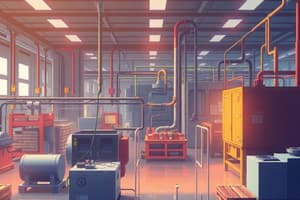Podcast
Questions and Answers
¿Qué tipo de proceso de fabricación implica la producción de pequeñas cantidades de bienes altamente personalizados?
¿Qué tipo de proceso de fabricación implica la producción de pequeñas cantidades de bienes altamente personalizados?
- Fabricación continua
- Fabricación por procesos
- Fabricación discreta
- Fabricación por taller (correct)
¿Cuál es uno de los procesos de unión que implica la conexión de piezas o componentes separados?
¿Cuál es uno de los procesos de unión que implica la conexión de piezas o componentes separados?
- Forjado
- Soldadura (correct)
- Recubrimiento
- Laminado
¿Qué tipo de fabricación implica la transformación de materiales en productos continuos como la producción química?
¿Qué tipo de fabricación implica la transformación de materiales en productos continuos como la producción química?
- Fabricación continua (correct)
- Fabricación discreta
- Fabricación por taller
- Fabricación por procesos
¿Cuál es uno de los procesos de acabado que agrega valor a un producto a través de tratamientos superficiales como pintura o electrochapado?
¿Cuál es uno de los procesos de acabado que agrega valor a un producto a través de tratamientos superficiales como pintura o electrochapado?
¿Cuál es uno de los componentes clave de los sistemas de producción según el texto proporcionado?
¿Cuál es uno de los componentes clave de los sistemas de producción según el texto proporcionado?
¿Cuál es la función principal de un sistema operativo?
¿Cuál es la función principal de un sistema operativo?
¿Cuál es una característica importante de los sistemas de producción?
¿Cuál es una característica importante de los sistemas de producción?
¿Qué papel desempeñan los sistemas operativos en relación con la multitarea?
¿Qué papel desempeñan los sistemas operativos en relación con la multitarea?
¿Qué describe mejor un sistema de producción?
¿Qué describe mejor un sistema de producción?
¿Cuál es una función importante de los sistemas operativos en relación con la seguridad?
¿Cuál es una función importante de los sistemas operativos en relación con la seguridad?
Flashcards are hidden until you start studying
Study Notes
Systems are complex networks of interconnected components designed to perform specific tasks or functions within various domains. This article will delve into three main aspects of systems: operating systems, production systems, and manufacturing processes.
Operating Systems
An operating system is software that manages computer hardware resources and provides common services for computer programs. It acts as an interface between the user and the hardware, managing tasks such as process scheduling, memory management, and input/output operations. There are several types of operating systems, including Linux, Windows, macOS, and Android.
Role of Operating Systems
Operating systems play a crucial role in ensuring efficient use of resources by managing multitasking, background processes, and resource allocation. They also provide security features, allowing users to control access to their systems and protect against unauthorized access.
Production System
A production system refers to an organized arrangement for producing goods and services. This can include manufacturing plants, agricultural farms, service organizations, and other production environments. These systems involve various components, including raw materials, production processes, and workforce.
Types of Production Systems
There are three main types of production systems:
-
Process manufacturing: Involves the transformation of raw materials into finished products, typically in a continuous process, such as in the chemical industry.
-
Job shop manufacturing: Involves the production of small quantities of highly customized goods, with each product requiring unique steps and resources.
-
Flowline manufacturing: Involves a series of operations arranged in a linear fashion, with each operation adding value to the product.
Key Components of Production Systems
Key components of production systems include raw materials, production processes, workforce, and quality control systems. These components work together to create goods and services efficiently and effectively.
Manufacturing Processes
Manufacturing processes involve the conversion of raw materials into finished products. These processes can be classified based on the level of transformation or the type of product being produced. Common manufacturing processes include:
-
Forming processes: These involve shaping raw materials into a desired form, such as forging, rolling, or extrusion.
-
Joining processes: These involve connecting separate parts or components together, such as welding, soldering, or adhesive bonding.
-
Finishing processes: These involve adding value to a product through decoration, coating, or other surface treatments, such as painting, electroplating, or heat treatment.
Types of Manufacturing Processes
There are two main types of manufacturing processes:
-
Discrete manufacturing: Involves creating separate units from raw materials, typically involving mass production techniques like assembly lines.
-
Continuous manufacturing: Involves creating a continuous flow product, such as chemical production or steel rolling.
In conclusion, systems encompass a range of interconnected components designed to perform specific functions within various domains. From operating systems that manage computers to production systems that create goods and services, these elements work together to facilitate efficient and effective operation in different fields. Understanding these aspects provides valuable insights into how complex systems operate and contribute to our daily lives.
Studying That Suits You
Use AI to generate personalized quizzes and flashcards to suit your learning preferences.




